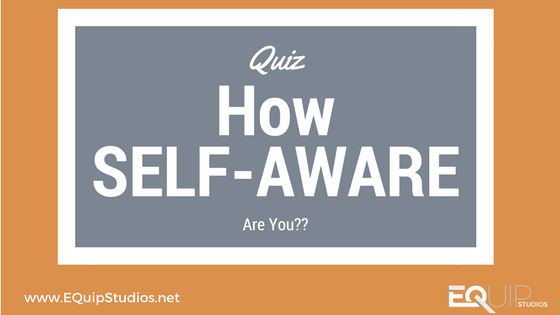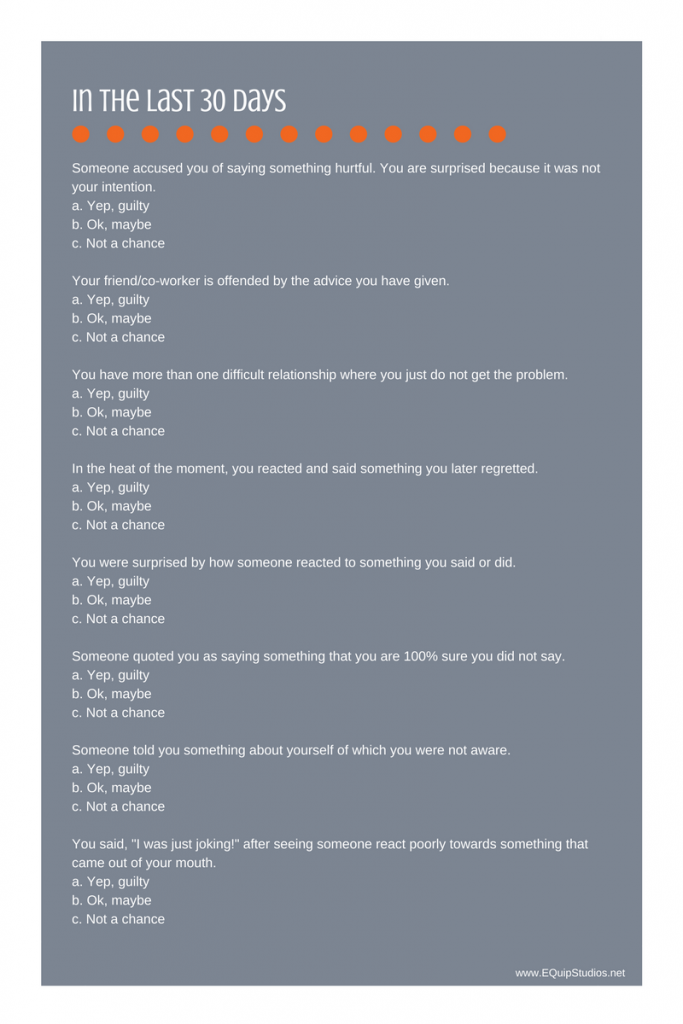90% of High Performers Have This. Do You?
Recently, I had the privilege of leading a group of entrepreneurs, leaders, and change makers through a Developing Emotional Intelligence workshop. We worked together to bust the myths we often believe about emotions (yes all of the above statements are FALSE) and discovered the value emotions play in achieving our goals.
As a key take away, participants acknowledged that emotions, whether we know it or not, influence how we respond to change, navigate conflict, and go after our goals.
Emotions influence how we respond to change, navigate conflict, and go after our goals.
- Take a moment and identify a goal you have for this year.
(Example: increase staff engagement by 10%) - As you imagine yourself accomplishing this goal, make a list of everything that will be necessary to successfully achieve this goal.
(Example: new learning about engagement, open-mind, time, patience, desire, determination, innovative thinking, ability to listen more, connection, problem solving, etc.) - Draw a horizontal line. Label the line with the word INTELLIGENCE on the left and EMOTION on the right.
- Plot the items you listed that require your INTELLIGENCE on the left, EMOTIONS on the right, and everything else that might be combination of both somewhere inbetween. Don’t worry about a right or wong answer, just plot the items where you think they fit best.
- What do you notice about your continuum? Are more items on one side of the continnum over the other? Or are they balanced? How about the items in the middle?
- What would happen if you had the skills to achieve your goals, but not the emotions such as motivation, determination, perseverance, or optimism? Or, vice versa??
This continuum illustrates what emotional intelligence looks like in action. Things like prioritizing, problem solving, overcoming obstacles, handling conflict, making decisions, and influencing others, all fall into the middle area where both cognition and emotions play a part.
So what is emotional intelligence?
Simply put, emotional intelligence is being smart with your feelings. It’s the ability to blend thoughts AND feelings together so that you can be intentional with your words and actions.
Emotional Intelligence
It’s interesting to point out that 90% of the high performers have greater than average emotional intelligence.
90%!
There was a time when people believed that cognition and emotion were opposite. But neuroscience teaches us that our brains are both rational and emotional at once. Emotional Intelligence is not the opposite of intelligence, nor is it feelings trumping thoughts.
Emotional Intelligence is the unique intersection of both the head and the heart working together.
@icoacheq Tweet
Without emotional intelligence, either facts or emotions are driving your decisions and actions.With emotional intelligence, you are able to blend both the rational and emotional data together to intentionally choose how you want to respond.

The following are eight insights that participants of the workshop discovered as they considered how to jumpstart their Emotional Intelligence.
When it comes to achieving your goals:
Pay attention to the thoughts and feelings that run in the background and in the foreground throughout the day. How are they spurring you on toward your goal? How are they holding you back?
Rest in the emotion for a minute or so. Remember emotions are not good or bad. They are data. Resist the urge to stuff or ignore certain emotions. Instead, be curious about the emotions you are feeling.
As you notice your emotions, identify them by name, joy, sadness, anger, anticipation, etc. Naming emotions helps us to become more familiar with them, and to recognize patterns that occur with certain emotions. For more intense emotions, neuroscience teaches us that the simple act of naming your emotions can lessen the intensity of them.
The simple act of naming your #emotions can lessen the intensity of them. #EmotionalIntelligence
@icoachEQ Tweet
Try to identify the value that is in the feelings you are experiencing…all feelings including the ones you might think are “bad”. For example, when I feel frustrated, it helps me to recognize the importance of what I am doing. If I didn’t care, I wouldn’t be frustrated!
Notice what triggers a reaction from you as you work to accomplish your goal. Do you notice things like obstacles, challenges, different opinions, stress, etc triggering an auto-pilot reaction? Be curious to understand the trigger. When did it start? What feelings are associated with the trigger? How does this trigger hinder or support your ability to achieve your goal? What would be a more helpful response?
Consider the feelings and thoughts that would help you move closer to your goal. What currently gets in the way of experiencing these feelings and thoughts?
Identify the choices you have and take a few extra minutes to think beyond what’s right in front of you. What haven’t you thought of yet? What has helped you be successful in the past? What intrinsic values are attached to your goal? What is going to help you stay the course and persevere?
Imagine yourself getting closer to achieving your goal. How will it feel? What will be different? Why is this goal so important? What difference will it make in your life? What difference will it make in the life of others?

About Kelli Porcaro, PCC, EQAP, EQCC
Kelli brings 25+ years of Organizational Development experience to her work as a Consultant and Coach. She works in a wide range of industries unlocking infinite possibility with leadership development, instructional design, change management, and emotional intelligence.
Kelli also serves on Faculty at the Lake Forest Graduate School Management.



